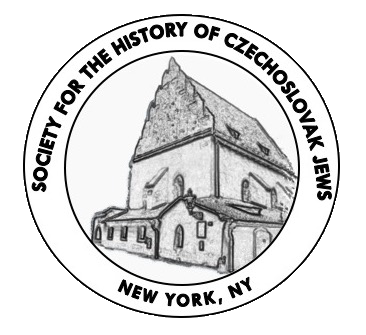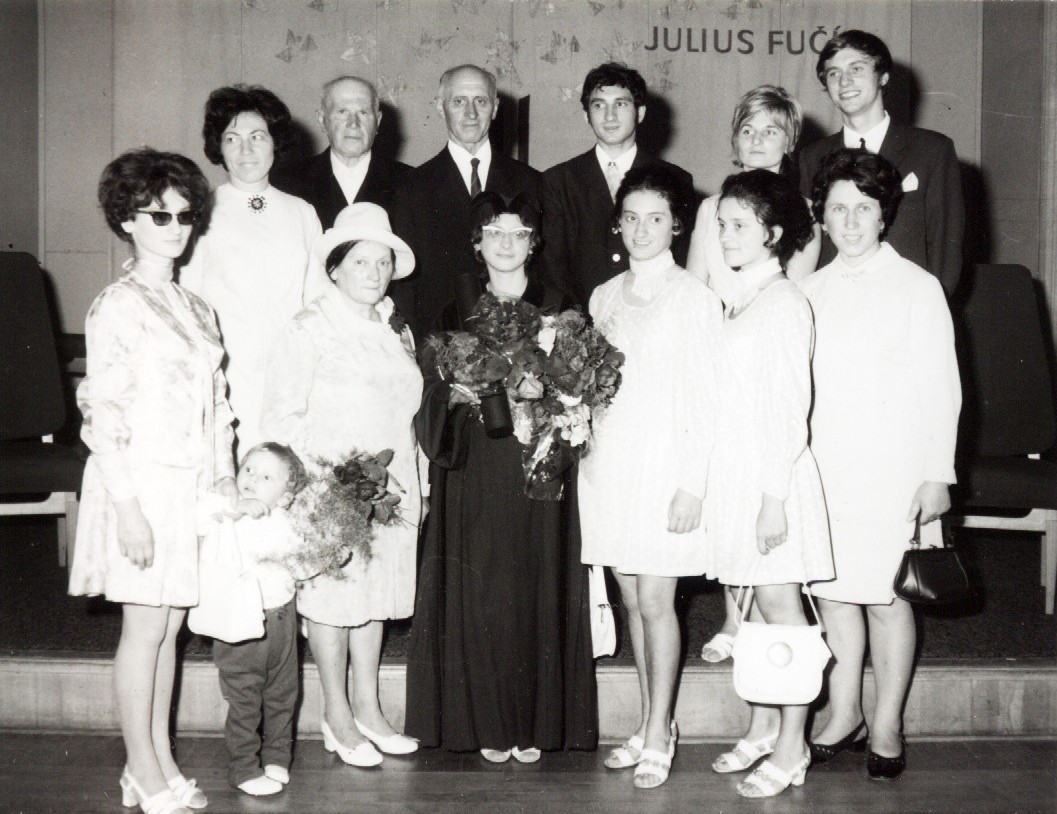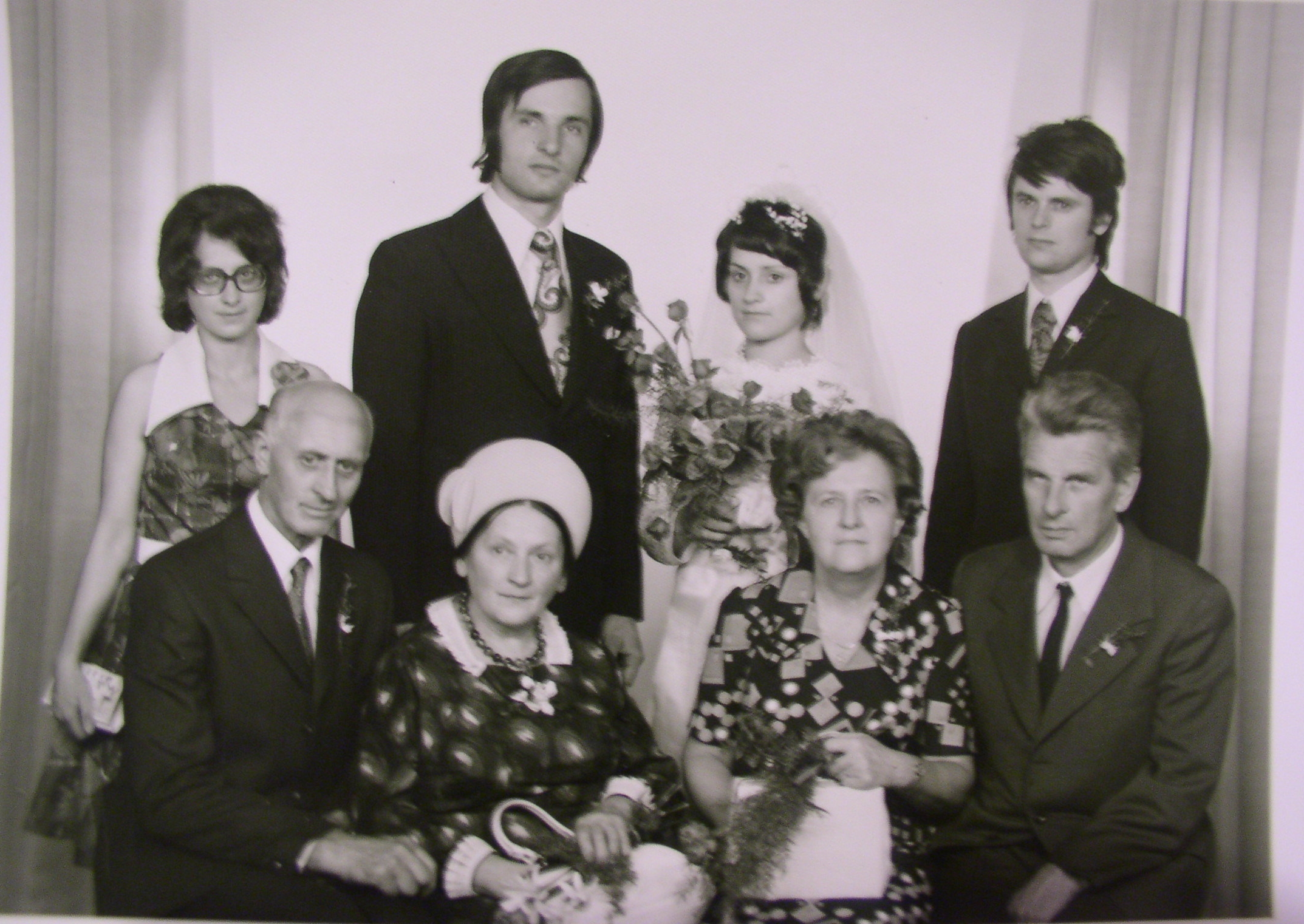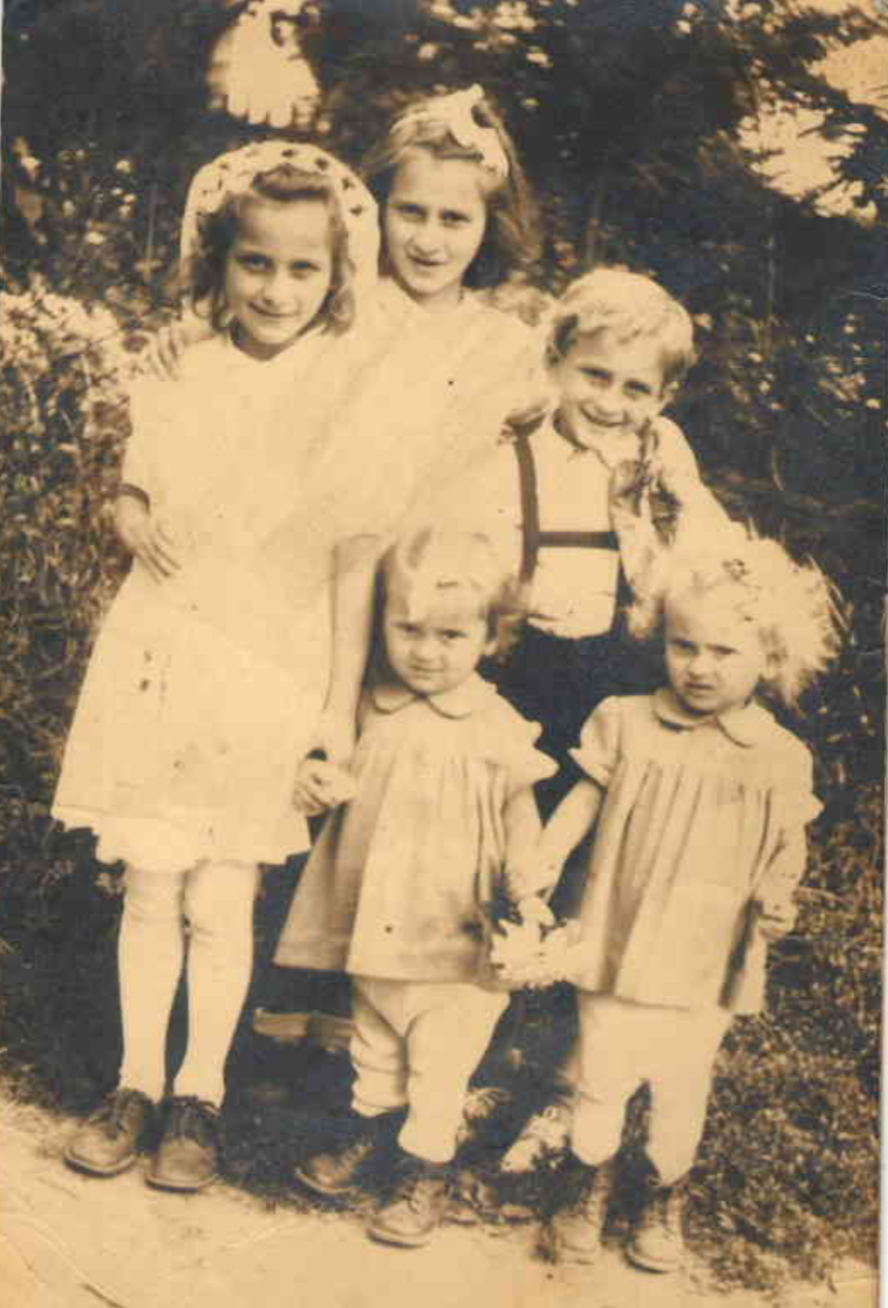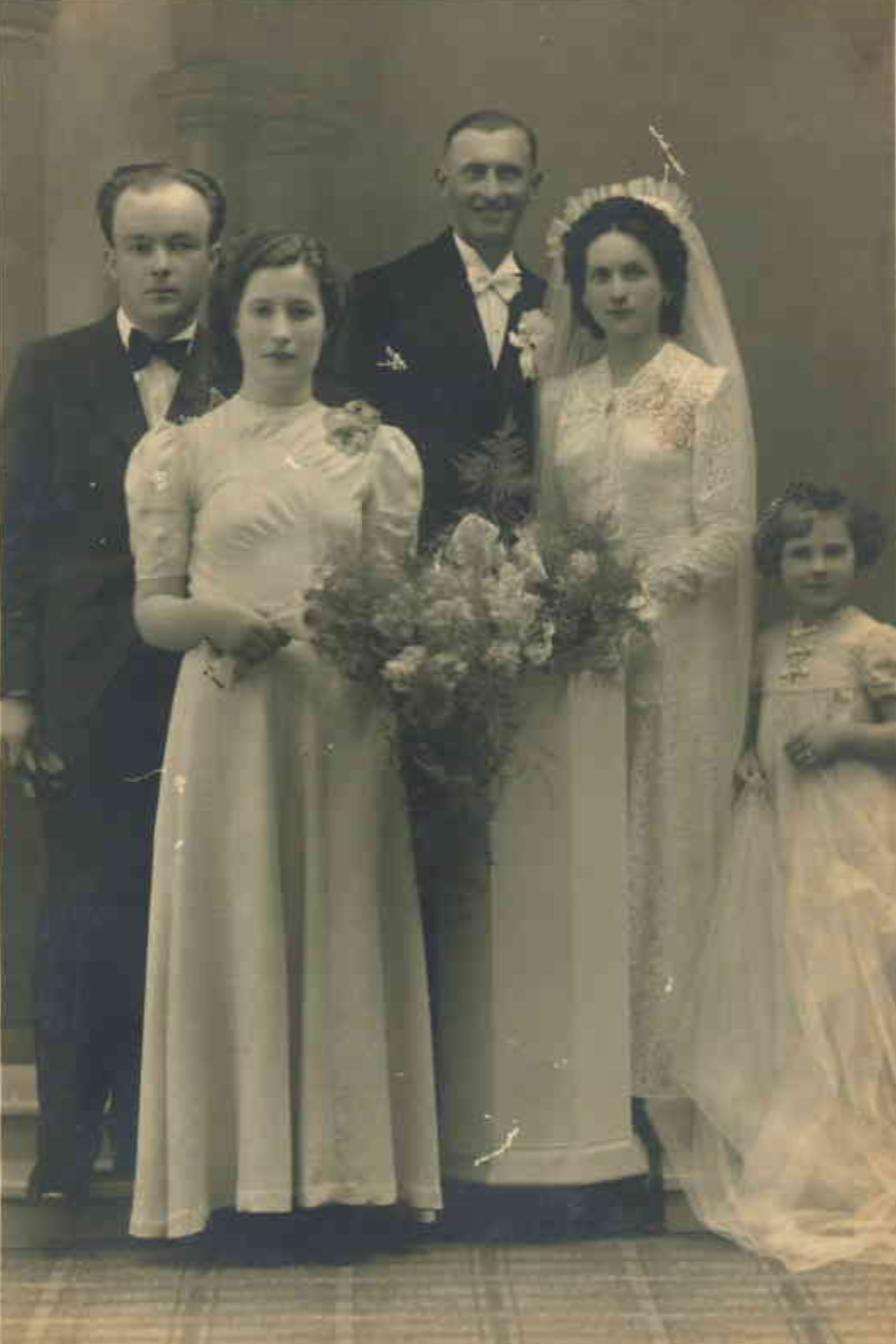MEMORIES
By Přibyslava Tichotová
28 September 1950, Hranice Czechoslovakia
– 27 January 2017, Prague, Czech Republic
(written by Přibyslava Tichotová in 2017, translated from Czech by Pavla Rosenstein, 2018)
I was born on 28th September 1950 in a maternity hospital in Hranice[1] in Moravia, 15 minutes later than my twin sister Venuška [pronounced “Vehnushkah”]. Together with my sister, we were the youngest of five children. Our eldest sister Zdislava was born on 21st April 1943, and we called her Zdiška [Pronounced “Zhdjishkah”]. Maruška [“Marushkah”] was born on 28th October 1944, and our only brother Čestmír [“Chestmeer”] was born on the 2nd of May 1946.
An even older sister was born in 1942, and had the same name as me, Přibyslava [“Prhybyslahvah”], but she died when she was three months old, possibly from tetanus or the sudden death syndrome. We all had peculiar Old Czech names, us twins were originally supposed to be called Jasnuška and Zlatuška [“Jasnooshkah” and “Zlahtooshkah”], but the Registry Office didn’t allow it, so we are called Václava [“Vaahclavah”] and Přibyslava. According to our mother, who was called Drahomíra [“Drahhomeerah”], a duchess who shared her name had a son called Václav, and a daughter called Přibyslava, and so we inherited their names. My name always seemed strange to me, partly because our eldest sister who passed away had the same one, and also because everyone used to ask me what to call me. I still can’t stand that question today, and answer either “Přibyslava” or “Přibuška” [Prhibushka].
My memory reaches back to when I was two or three years old, when I was home alone in Radvanice with my “stařenka,” which is what we used to call our grandmother. My twin sister Venuška was in hospital with pneumonia and our parents and the rest of our siblings went to visit her. Apparently she greeted everyone as they arrived, calling each visitor by their name, and then asked: “where is Přibuška?”
I remember how I used to lie in bed at home in a rattan basket bed and my grandmother would sing to me. Her favourite song was called “A child was orphaned”, perhaps because our grandmother was herself orphaned when she was ten years old, and her mother passed away. Our grandmother used to look after me and Venuška often, and she would always show us colourful pictures of Saint Nicholas and the Devil [2], and we really liked that.
Our older sisters would also often look after us, especially our eldest sister Zdiška, who would protect us when our brother would torment us. That usually happened when we didn’t want to play with him according to his expectations. Česta [diminutive version of Čestmír] always used the “sugar and whip”[3] approach with us. If we obeyed him, he brought us snacks from school. But, if we protested, he used all his strength against us. He was four years older, and compared to us, he was very strong. I suppose it was a shame that he didn’t have a brother, who may have been able to tame him a bit.
“Most of our mother’s relatives died during the Holocaust because of their Jewish heritage, which affected our mother for the rest of her life.”
We didn’t have an easy life, because our family was heavily affected by the Second World War and Communism, which followed shortly after.[4] Most of our mother’s relatives died during the Holocaust because of their Jewish heritage, which affected our mother for the rest of her life, particularly the fact that in 1942 Germans took her mother – our grandmother – to a concentration camp. That was in spite of the fact that our grandmother converted to Roman Catholic faith for our grandfather. Nevertheless, she was given away as a sacrificial lamb of the Jewish town where she came from [Radvanice].
“At first, our grandmother was taken to Terezín, from where she would send our mother letters, describing hunger at the camp.”
At first, our grandmother was taken to Terezín[5], from where she would send our mother letters, describing hunger at the camp. Later, she passed away while being transported to the Treblinka camp in Poland. Our older sister Maruška discovered this in the 1990s, when she managed to gain access to transport and death lists for our relatives. Our mother never knew what happened, and thought all her life that her mother died in Auschwitz. She even wanted to visit Auschwitz, when her agricultural collective where she worked was organizing a trip there.
Thankfully, she didn’t manage to go, because the party was leaving at night, and the others didn’t wait for her, thinking that she was asleep. I think though, that they left early on purpose. It may have been for the best, because I myself was very upset when I visited Auschwitz, and I’m not sure what it would have done to my mother. Our father too, bore the burden of the Second World War, when towards the end, he was dragged to a concentration camp, where he survived hunger and beatings, returning with very damaged health. It was very brave of him to marry a “half-Jew” during the war.
“It was very brave of him to marry a “half-Jew” during the war.”
The tentacles of Communism didn’t leave our family in peace for long either. In 1950, shortly before I was born, Communists took our father away to prison, where they kept him for three weeks. A trial at the infamous Uherské Hradište[6] followed. Of course, like many others, he was manipulated, and shortly after, the chairman of the regional party – a prominent Communist figure and allegedly a German collaborator during the war - moved into our family home in Kelč.
At first, he wanted to restrict our mother to just one room, but eventually he took over the whole house. The pretext was that our family also lived in Radvanice near Přerov, and didn’t need both houses. The reality was that our mother owned a farm in Kelč, while our father owned one in Radvanice – both of which they managed. The court convicted our parents of unheard of crimes and gave them bizarre, almost feudal punishments. Our mother was ordered 14 days of “harsh” prison, with one hard bed a week, and our father was ordered 21 days of “harsh” prison, with one hard bed a week and a fine of 15,000 Czechoslovak Crowns.[7] The reason for this sentence was that our parents allegedly harvested unripened grains and nuts and other nonsense. When Venuška and I requested rehabilitation on their behalf after Communism fell in 1989, we were given 200 Czechoslovak Crowns, with the explanation that we didn’t have a receipt for the fine our father had paid. Even though it was clear, that had he not followed the order and paid it, he would have spent more time in prison.
From 1950, we all lived with our paternal grandmother in Radvanice, and those years were tough. Our parents had to give away large amounts of their farm produce to the state, so we didn’t have much left over. But the worst was still to come. Roughly from 1955 to 1956 we had a daily visit from the regional party secretary to pressure our parents into entering the state agricultural collective. Our parents kept resisting, but eventually, under the threat of political prison, entered the collective. They couldn’t believe what they experienced. The collective’s director was a party officer with no knowledge of agriculture (he had one goat before he took up his post), and that was reflected in how the collective was run. We were given 300 Czech crowns for a family of seven, so we lived in poverty. We did have a large garden, where we could grow something, but it was impossible to feed five children from it.
When things were especially hard, our father went to work at the local brickworks and earned a good amount of money there. However, the director persuaded him to return to the collective. The forced membership of the collective was not unlike a modern version of feudalism. In 1965, when we were moving back to Kelč, the collective refused to give our father a work exit stamp, and he had to go to court to receive it. Without a work exit stamp it was impossible for him to get work anywhere else. Later, the situation at the collective improved, but not in a way that allowed us to feel at ease.
Our older siblings were affected too. When our older sisters graduated from high school and applied for university, they were not able to go where they wanted. Zdiška, instead of going to her chosen philosophy faculty, was ordered to study teaching at the Pedagogy Institute, and Maruška was not able to study medicine because it was against the Communist ideology [for members of families who owned land, and were therefore seen as class enemies, to study medicine], so she started studying medical courses at a nursing college instead. When our father went to each school to ask why they were not permitted to study there, he was told that it was because of a negative review from the regional party in Radvanice.
Apparently, the party painted our parents as thieves and pinned a range of crimes on them. Maruška eventually did manage to study medicine, after completing a long distance course. Similarly, our brother Česťa wasn’t able to attend veterinary college, because a neighbour’s son got the place, and was sent to agricultural training school, from which he ran away. Later he managed to study at an agricultural university, and then graduated in veterinary medicine and later in Electrotechnics from CVUT[8].
Venuška and I had it easier. We finished secondary school in 1965 and then went to study at a gymnasium.[9] While we were still pressured to train in agriculture, Venuška studied law and later social sciences at Charles University in Prague, and I studied at the Chemical-Technological University in Prague, where I was able to start right after graduating from the gymnasium in 1968.
In 1965, we moved to Kelč. The reason, like so much else, was quite “comical”. When the regional party chairman evicted us from our home in the 1950s, he of course didn’t pay us any rent, nor did he maintain the house. Instead he ran it to the ground, and so in 1964 we received a letter telling us we have to go repair the house.
Our house in Radvanice was in no great shape either, and while my father started building a new structure, it was hard to progress, and so our parents decided to repair the house in Kelč instead and move there. Our mother still felt closer to Kelč. I think the neighbours there were nicer, and she knew more people. People in Radvanice seemed to me to be envious, for example they didn’t like it that we all did well at school, and that we had “loads of money” - which was ridiculous, and they also taunted us about our mother’s Jewish roots. For example, one of the older neighbours would always shout, “the yids are coming”, whenever we walked past her house.
“One of the older neighbours would always shout, “the yids are coming”, whenever we walked past her house.”
I didn’t realize it at the time, but there were a number of children with special needs in the village. For example, one of my classmates at university asked me if all the children from Radvanice were particularly slow. He was from the nearby town of Přerov, where one of his classmates from Radvanice, may have had learning difficulties. He wondered how someone else from the village was able to go to university. Venuška and I, with our father’s help, attended a different school in Přerov, so we were never in a class with that student. We did go to school with him when we were very small, but at that age, we didn’t notice it.
I always enjoyed talking to my mother about her family, her relatives, and if she was in a good mood, the war, which was very painful for her. That’s probably why I learned so much about the family. Our maternal grandmother was also one of five children, but by contrast, she had four brothers. She got married when she was forty-one years old, and our grandfather was seven years younger than her.
She had to convert from Jewish to Catholic faith in order to marry him, and according to my mother, she took it seriously, going to church every Sunday. Our mother was an only child, after our grandmother lost two pregnancies. Our mother was very close to our grandmother, in fact when I was younger I used to get angry when our mother would criticize something we would be doing by saying, “my mother also did it like this.” Now, I understand. It was a different time.
My mother experienced a great blow when she was thirteen years old. Her father died then, so of course we never knew our grandfather. Her father’s death hit our mother hard, and very soon she was responsible for the family farm. At fourteen, she went to study farm management in Olomouc in Moravia, and by twenty she was managing the farm on her own. And after her marriage at 27, she was running two farms.
It happened like this. Our father inherited the family farm in Radvanice after his childless relatives, even though that wasn’t a given in the family. Our father was the youngest of three brothers, who lived in Dolní Újezd, and our grandmother, who had the last word in the family, followed unwritten time-honoured rules. The eldest son would get the farm, the middle son would go to university, and the youngest son would get what’s left. Our father’s eldest brother Jan was supposed to take over the farm in Radvanice, but his wife didn’t like it there. And our grandmother didn’t love Dolní Újezd, because she didn’t get on with her neighbor. So, the family moved to the farm in Radvanice, and the eldest son stayed in Dolní Újezd. The middle brother František first went to study to become a priest, but rebelled, and using his own funds, went to study law. When our father got married, our mother thought that they would run the farm in Kelč together, and my father’s parents would manage the farm in Radvanice, with his brother František. But, his father soon passed away (on 29th September 1943), and so our parents ended up managing both farms in Kelč and Radvanice.
Fortunately, Radvanice lies in the fertile Hané region, which meant that the produce there was ready about fourteen days before Kelč, so our parents made do, even though the two farms were 35km apart. Then came the 1950s, and the Communists evicted our parents from Kelč. Our mother then took in her closest relative – our grandmother, her father’s mother, whom she cared for until her death on 30th January 1948.
Our grandmother, our father’s mother, was very conservative and didn’t like to change traditions. Even when later, our father studied agriculture long distance, she was against it. That was probably also the reason why our father didn’t take to our mother’s idea after the war to quickly get a degree in law or medicine and rent out the farm. I think he was afraid of our grandmother. It was a shame, because our father was very social, he immediately took up a conversation with anyone, and an occupation of a doctor would suit him very well. Our grandmother died in 1964 aged eighty-five in Dolní Újezd, where our relatives and doctors looked after her for the last two months. I think she missed being in Radvanice though, where she had her own little house and could manage things according to her own will.
After we moved to Kelč in 1965, our father started working in DEZE [chemical works] in Valašské Meziříčí, where he worked until he was 65, and where he was, I think, happy. Our mother started taking a half-invalid’s pension of 2,400 Czechoslovak Crowns a month, and after a review, was eventually qualified for a full pension with an additional 480 Crowns a month. Even with our father’s earnings from the chemical works, it wasn’t much, because all five of us were studying at university, which we could only afford thanks to socialist grants. And by then, Zdiška started working, teaching in Kelč, after her final year spent working near the border in Štíty, which she didn’t like. Maruška later got an academic scholarship to continue to study medicine, and she also worked at a hospital.
Download the original in Czech here.
Footnotes:
[1] Hranice was a predominantly Jewish town in South-Eastern Moravia.
[2] Saint Nicholas is a popular holiday celebrated in Czech Republic on 5-6 December, and often involves adults dressed up as Saint Nicholas and the Devil.
[3] Czech version of the phrase “carrot and stick”
[4] Czechoslovakia became a Communist country in 1948, three years after the Russian liberation from Nazi Germany.
[5] Also known as Theresienstadt, a concentration camp in Czechoslovakia, near Prague.
[6] Uherské Hradište was a notorious prison used during Communist show trials in the early 1950s. It was known for harsh interrogations that were accompanied by beatings, torture, and the abuse of psychotropic substances.
[7] For reference, the average salary in Czechoslovakia in 1949 was 870 Czechoslovak Crowns per month.
[8] Czech Technical University in Prague
[9] The Czech school system, like many others in Europe comprised of basic schooling until 14/15 years of age, and then entering either a training college, or an academic “gymnasium”. Those who graduated from a gymnasium could attend university.
